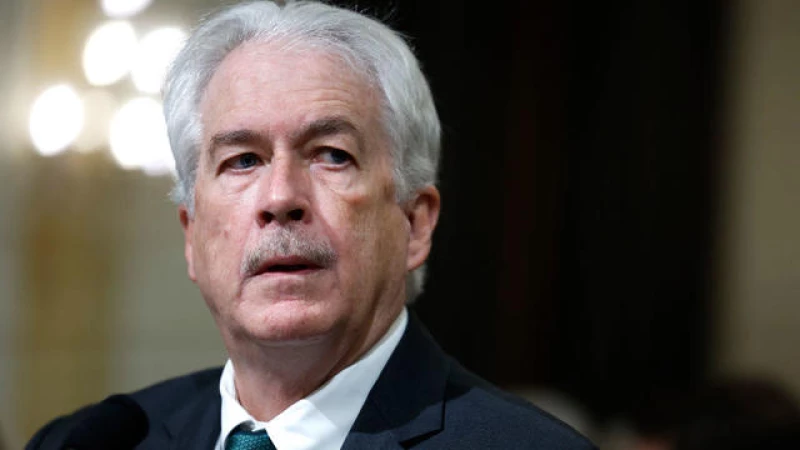CIA Director William Burns acknowledged Thursday that without military assistance from the U.S., Ukraine could experience significant setbacks in its war with Russia.
Ukrainians are "at a tough moment on the battlefield right now," Burns said during a Q&A session at the Bush Center Forum on Leadership in Dallas.
With supplemental assistance from the U.S., Burns said, Ukrainian forces "can hold their own on the battlefield in 2024 and continue to do damage with deeper strikes in Crimea...and against the Black Sea fleet."
Burns added that "with the boost that would come from military assistance, both practically and psychologically…the Ukrainians are entirely capable of holding their own through 2024 and puncture Putin's arrogant view that time is on his side."
His comments come as a deadlocked Congress continues to stall on Ukraine aid. On Wednesday, House Speaker Mike Johnson unveiled three bills to provide military assistance to Ukraine, Israel and Taiwan, including $60.4 billion for Ukraine.
"The situation is much more dire without additional support," Burns warned. "There is a significant risk that Ukraine could face defeat on the battlefield by the end of 2024, or at least allow Putin to dictate terms for a political resolution."
Burns also discussed key national security issues concerning the Middle East, China, and the wider implications of the conflict in Ukraine, particularly in the Indo-Pacific region. He emphasized the importance of Western solidarity in deterring aggression, noting its impact on China's President Xi Jinping's calculations regarding Taiwan. Burns stressed the need to maintain support for Ukraine to prevent undermining this deterrence.
Regarding the Middle East, Burns described the current situation as highly volatile, drawing on his extensive experience in public service to highlight the severity of the moment.
He characterized Iran's recent attack on Israel as a "spectacular failure" due to Israel's strong defense capabilities, effective intelligence, and support from the U.S. and regional allies.
Burns' remarks preceded Israel's missile strike on Iran early Friday morning.
He expressed the administration's hope for de-escalation, especially given Israel's demonstrated military superiority.
During recent months, Burns has been actively involved in discussions regarding cease-fire and hostage-release negotiations in the conflict between Israel and Hamas.
Officials from the United States have been advocating for a six-week cease-fire to facilitate the gradual release of hostages and the corresponding liberation of Palestinian prisoners held in Israeli jails. Following the Hamas terrorist assault on October 7, it was reported that approximately 240 individuals were taken captive. However, even after six months, less than half of the hostages have been freed.
Burns shared that he has interacted with the families of the hostages and highlighted the challenges in reaching an agreement, describing the process as "very difficult."
Despite the obstacles, Burns expressed his determination, stating, "It's a big rock to push up a very steep hill right now." He also expressed disappointment over Hamas's negative response to the latest proposal, emphasizing the importance of continued efforts to find a resolution.
"I cannot honestly say that I'm certain that we're going to succeed, but it's not going to be for lack of trying," Burns affirmed. "And I do know that the alternatives are worse."
Addressing a gathering of steelworkers in Pittsburgh on Wednesday, President Biden underscored the extensive scope of U.S. competition with China, spanning various sectors such as space, technology, and cybersecurity.
Biden announced his intention to request U.S. trade representative Katherine Tai to triple the current tariffs on Chinese steel and aluminum, raising them from 7.5% to a higher rate.
Burns expressed his belief that Xi was committed to controlling Taiwan during his political career.
Although he clarified that this did not indicate an immediate invasion plan, he emphasized the need to take this ambition seriously.
Highlighting the growing collaboration between China and Russia, Burns described it as a significant challenge for the U.S.
He also raised concerns about transnational repression, where autocratic regimes like Russia, China, and Iran target activists beyond their borders to "kill or intimidate" them.
Recognizing the importance of addressing technological challenges such as pervasive surveillance, Burns underscored the advantages of strategically declassifying intelligence.
He mentioned the "Duty to Warn" obligations that require intelligence agencies to issue alerts when civilian lives are in danger, citing recent terror incidents in Russia and Iran.
Burns also addressed the challenges from technological advancements, including ubiquitous surveillance, as well as the benefits of strategic declassification of intelligence. He addressed the "Duty to Warn" responsibilities biding intelligence agencies to provide warnings when civilian lives are at stake, mentioning the recent terror attacks in Russia and Iran.
According to the U.S. government, we shared highly precise intelligence with Russian authorities regarding an imminent ISIS terrorist attack on a prominent entertainment venue in Moscow. Despite this warning, the Russian services failed to take necessary actions or investigate further into the matter.







